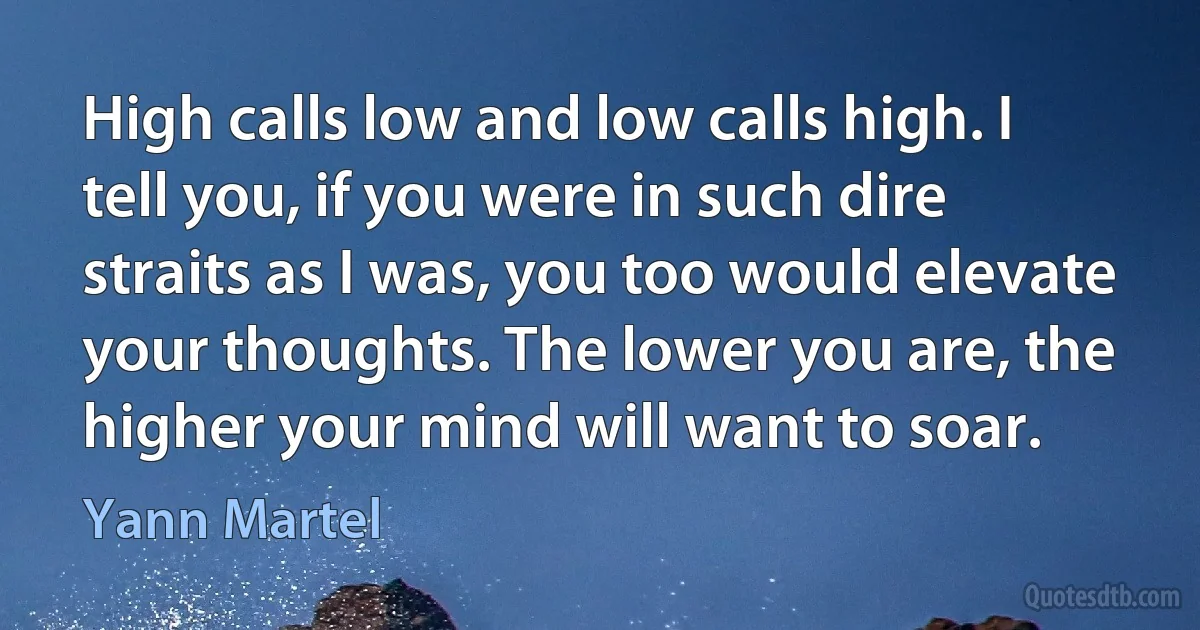Lower Quotes - page 9
I consider part of lower Manhattan to be hallowed ground. Nearly 3,000 people lost their lives in the World Trade Center towers... and for that reason alone, our nation should make absolutely sure that what gets built on 'Ground Zero' is an inspiring tribute to all who loved the Twin Towers, worked in them, and died there.

David Shuster
No one mentioned Communism or the Hiss Case until we sat over our coffee in the living room. Mrs. Philip Jessup had just used her personal good offices to try to get me off TIME. Luce was baffled by the implacable clamor of the most enlightened people against me. "By any Marxian pattern of how classes behave," he said, "the upper class should be for you and the lower classes should be against you. But it is the upper class that is most violent against you. How do you explain that?" "You don't understand the class structure of American society," said Smetana, "or you would not ask such a question. In the United States, the working class are Democrats. The middle class are Republicans. The upper class are Communists."

Whittaker Chambers
As you know, Bergson pointed out that there is no such thing as disorder but rather two sorts of order, geometric and living. Mine is clearly living. The folders I need are within reach, in the order of frequency with which I use them. True, it gets tricky to locate a folder in the lower levels. But if you have to find it, you look for it. That takes less time than putting them away every day.

Jean Piaget
The individual, so far as he suffers from his wrongness and criticizes it, is to that extent consciously beyond it, and in at least possible touch with something higher, if anything higher exist. Along with the wrong part there is thus a better part of him, even though it may be but a most helpless germ. With which part he should identify his real being is by no means obvious at this stage; but when stage 2 (the stage of solution or salvation) arrives, the man identifies his real being with the germinal higher part of himself; and does so in the following way. He becomes conscious that this higher part is coterminous and continuous with a more of the same quality, which is operative in the universe outside of him, and which he can keep in working touch with, and in a fashion get on board of and save himself when all his lower being has gone to pieces in the wreck.

William James
The likeness of man above the throne is divided, the upper part being the colour of chashmal, the lower part like the appearance of fire. As regards the word chashmal, it has been explained to be the compound of two words chas and mal, including two different notions, viz., chash signifying "swiftness," and mal denoting "pause." The two different notions are here joined in one word in order to indicate figuratively the two different parts,-the upper part and the lower. We have already given a second explanation, namely, that chashmal includes the two notions of speach and silence; in accordance with the saying of our Sages, "At times they are silent, at times they speak."

Maimonides
By actually working with the Black lower class or within their communities as a result of their ideologies, a separationist may better understand the desparation [sic] of their situation and feel more hopeless about a resolution as opposed to an integrationist who is ignorant to [sic] their plight.

Michelle Obama
...classic philosophy maintained that change, and consequently time, are marks of inferior reality, holding that true and ultimate reality is immutable and eternal. Human reasons, all too human, have given birth to the idea that over and beyond the lower realm of things that shift like the sands on the seashore there is the kingdom of the unchanging, of the complete, the perfect. The grounds for the belief are couched in the technical language of philosophy, but the grounds for the cause is the heart's desire for surcease from change, struggle, and uncertainty. The eternal and immutable is the consummation of mortal man's quest for certainty.

John Dewey
Race feeling may be called prejudice by those whose careers are cramped by it, but it is a natural antipathy which serves to maintain the purity of type. The unfortunate fact that nearly all species of men interbreed freely leaves us no choice in the matter. Either the races must be kept apart by artificial devices of this sort, or else they ultimately amalgamate, and in the offspring the more generalized or lower type prevails.

Madison Grant
The lower classes of people in Europe may at some future period be much better instructed then they are at present; they may be taught to employ the little spare time they have in many better ways than at the ale-house; they may live under better and more equal laws than they have hitherto done, perhaps, in any country; and I even conceive it possible, though not probable, that they may have more leisure; but it is not in the nature of things, that they can be awarded such a quantity of money or substance, as will allow them all to marry early, in the full confidence that they shall be able to provide with ease for a numerous family.

Thomas Malthus
When Ling was communicating to any person the signs by which messengers might find him, he was compelled to add, "the neighbourhood in which this contemptible person resides is that officially known as 'the mean quarter favoured by the lower class of those who murder by treachery'," and for this reason he was not always treated with the regard to which his attainments entitled him, or which he would have unquestionably received had he been able to describe himself as of "the partly-drained and uninfected area reserved to Mandarins and their friends.

Ernest Bramah
Who's an Aryan? And what are these lower peoples anyway? Well, Hitler taught that the blond-haired, blue-eyed Norwegians were close to pure Aryan. Did you follow all of that? The blond-haired, blue-eyed Norwegian. And he thought the Germans were mostly Aryan? The Mediterranean's are slightly Aryan. Slavics are half Aryan, half ape. Orientals are slightly ape. The black Africans are mostly ape and the Jews are close to pure ape. Hitler killed the Jews because of his evolution thinking. We fought a really big war, probably a 100 million people died in World War II altogether because of that stupid theory. It's not just dumb, folks, it's dangerous.

Kent Hovind
I suspect SARS is one of the many, many, many man-made pathogens to purposely lower the human population. That's just what I would suspect. I love my country, I fear my government, okay. There have been all kinds of things produced in the last 50 years in various laboratories - and things like that - that are designed to kill people. Bottom line: I think SARS is probably one of those man-made pathogens, like probably AIDS is the same thing.

Kent Hovind
In its struggle for power the proletariat has no other weapon but organisation. Disunited by the rule of anarchic competition in the bourgeois world, ground down by forced labour for capital, constantly thrust back to the 'lower depths' of utter destitution, savagery, and degeneration, the proletariat can, and inevitably will become an invincible force only through its ideological unification on the principles of Marxism being reinforced by the material unity of organisation, which welds millions of toilers into an army of the working class.

Vladimir Lenin
By the time I came to England at the age of sixteen I'd seen a great variety of landscapes. I think the English landscape was the only landscape I'd come across which didn't mean anything, particularly the urban landscape. England seemed to be very dull, because I'd been brought up at a much lower latitude - the same latitude as the places which are my real spiritual home as I sometimes think: Los Angeles and Casablanca. I'm sure this is something one perceives - I mean the angle of light, density of light. I'm always much happier in the south - Spain, Greece - than I am anywhere else. The English one, oddly enough, didn't mean anything. I didn't like it, it seemed odd. England was a place that was totally exhausted.

J. G. Ballard
It may be observed, that provinces amid the vicissitudes to which they are subject, pass from order into confusion, and afterward recur to a state of order again; for the nature of mundane affairs not allowing them to continue in an even course, when they have arrived at their greatest perfection, they soon begin to decline. In the same manner, having been reduced by disorder, and sunk to their utmost state of depression, unable to descend lower, they, of necessity, reascend; and thus from good they gradually decline to evil, and from evil again return to good. The reason is, that valor produces peace; peace, repose; repose, disorder; disorder, ruin; so from disorder order springs; from order virtue, and from this, glory and good fortune.

Niccolò Machiavelli



